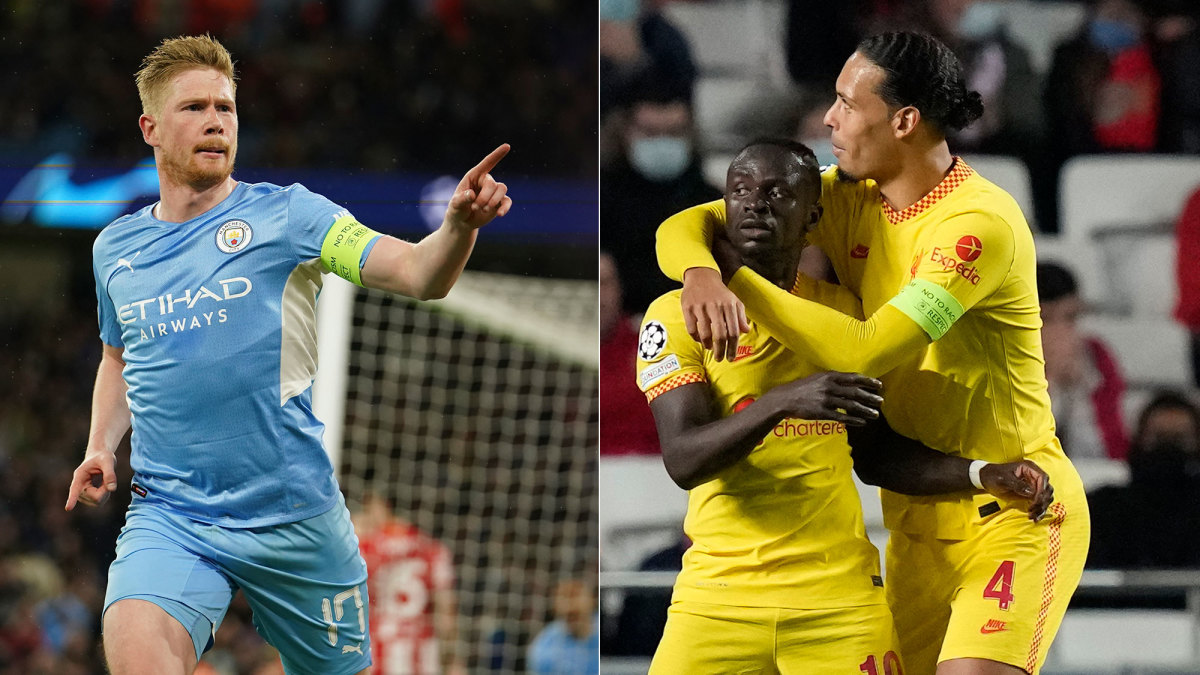England’s Top Two Clubs May Be Europe’s Finest As Well
Manchester City and Liverpool are the best two teams in England, and they might be the best two teams in Europe. The way the Champions League draw has worked, the contenders for the Premier League title could end up meeting in the continental final in Paris at the end of May, and both took a step closer to that with victories in the first legs of their respective Champions League quarterfinals on Tuesday. Both were dominant, and both won relatively comfortably, Liverpool 3–1 away to Benfica and Man City 1–0 at home against Atlético Madrid.
Man City will play Liverpool in the league at the Etihad on Sunday and then again in the FA Cup semifinals at Wembley the following Saturday. With the second legs of these Champions League ties to come next Wednesday, the sense is that the next 10 days could define the season for both clubs. Such has been Liverpool’s relentless form, that Man City, without doing much wrong, has seen a Premier League lead that once seemed impregnable whittled down to a single point. Were Liverpool to win on Sunday, it would become the clear favorite.
And such has been the feeling of Premier League domination of the Champions League—two of the past three finals have been all-English affairs, while the enormous broadcast deals have insulated Premier League clubs from the worst financial impact of the pandemic as others have struggled—that these quarterfinal first legs felt almost like a warmup to Sunday’s main event.

City’s was probably the harder task, more because of Atlético’s history in the Champions League than for anything it has done this season. Perhaps most significant in that history was the semifinals in 2016, when Pep Guardiola’s Bayern Munich was beaten on away goals by Atlético. That was the third time since 2010 that a Guardiola side had lost a semifinal it had dominated, and was what seemed to plant the seed of doubt that has led to the very strange teams selections in the exits against Liverpool in 2018 and Lyon in 2020 and in the final against Chelsea last season.
It’s been as though Guardiola, paranoid about the possibility of the opposition scoring on the counter, has taken steps to try to head off that danger that have served only to disrupt his own team. There was no particularly odd pick here, the only slightly surprising selections being the preference for Bernardo Silva over Phil Foden as the false nine and Nathan Ake being deployed at left back with João Cancelo on the right in the absence of the suspended Kyle Walker.
The game followed a predictable pattern, with Atlético sitting deep and City camped in its half, probing for an opening. In 2016, Guardiola had his Bayern whip in cross after cross in the belief that Atlético’s players were so focused on specific tests that they struggled at times with second balls, and there was a similar dynamic at play here. It was a triple substitution from Guardiola that led to the deadlock being broken, as Foden had been on the pitch for less than two minutes when he slid a pass through for Kevin De Bruyne to score with 20 minutes remaining.
The breakthrough arrives at last for Man City! Kevin De Bruyne scores the opener, while Phil Foden makes an instant impact off the bench to set him up. 1-0! #UCL
— SI Soccer (@si_soccer) April 5, 2022
(via @TUDNUSA) pic.twitter.com/XPmsNz1luX
It’s never easy to assess Atlético given how it lures an opponent on, but it offered almost no threat and only a couple of desperate blocks prevented City from winning more comfortably. Other than one silly yellow card for Gabriel Jesus that means he will be suspended for the second leg, City did not fall into the trap Manchester United had in the last round of reacting to Atlético’s provocations. While the atmosphere will be different in the Estadio Wanda Metropolitano next week, it’s hard to see how Atlético can become more aggressive without leaving itself more open to City’s passing and pressing.
Liverpool looked to be having a rather more straightforward time of it away to Benfica. Ibrahima Konaté’s first goal for the club, headed in from a corner, put Jürgen Klopp’s side ahead, and Sadio Mané doubled that advantage before halftime as Luis Díaz headed down a typically precise Trent Alexander-Arnold cross.
Golazo Liverpool! Trent Alexander-Arnold’s cross is headed down by Luis Díaz right into Sadio Mané’s path, and it’s 2-0 in Portugal #UCL
— SI Soccer (@si_soccer) April 5, 2022
(via @TUDNUSA) pic.twitter.com/qrZLXJZEhM
But early in the second half Konaté made a mess of Rafa Silva’s cross, and Darwin Núñez added to his burgeoning reputation with a calm finish.
But that was against the run of play, and Díaz put the seal on an excellent Liverpool win, seizing on Naby Keïta’s deflected pass and rounding goalkeeper Odysseas Vlachodimos to restore the two-goal margin that the Reds will take back to Anfield next week. It was another night that highlighted the quality of the Premier League’s top two—and there could be quite a few more to come, both domestically against each other in England and on the road to Paris, where their burgeoning rivalry could reach its climax.
More Soccer Coverage:
